成语典故之中英对照
- 格式:doc
- 大小:49.50 KB
- 文档页数:9

1、刻舟求剑:相传在战国时代宋国,有一个农民,日出而作,日入而息.碰到好年成,也可是刚才吃饱穿暖;一遇灾荒,可就要忍饥受饿了.他想改良生活,但他太懒,胆量又特小,干什么都是又懒又怕,总想碰到奉上门来的不测之财。
奇观终于发生了。
暮秋的一天,他正在田里耕地,四周有人在狩猎。
吆喝之声四周起伏,吃惊的小野兽没命的奔跑。
忽然,有一只兔子,不偏不倚,一头撞死在他田边的树根上。
当日,他美美地饱餐了一顿。
此后,他便不再种地。
一天到晚,守着那奇特的树根,等着奇观的出现。
成语“刻舟求剑”,比喻亡想不劳而得,或死守狭小的经验,不知变通。
staying by a stump waiting for more hares to come and dash themselves against itthis story took place more than 2,000 years ago,in the warring states period ( 475-221b.c.) .tradition has it that in the state of song at that time there was a man who was famousfor staying by a stump waiting formore hares to come and dash themselves against it.he was a yong farmer,and his family had been farmers for generations.year after year and generation after generation, farmers used to sow in spring and harvest in autumn,beginning to work at sunrise and retiring at sunset.in good harvest years,they could only have enough food to eat and enough clothing to wear.if there was a famine due to crop failure,they had to go hungry.this young farmer wanted to improve his life.but he was too lazy and too cowardly.beinglazy and cowardly over everything,he often dreamed of having unexpected blessings.a miracle took place at last. one day in late autumn,when he was ploughing in the field,two groups of people were hunting nearby.as shoutings were rising one after another,scared hares were running desperately.suddenly,a blind hare dashed itself headlong against the stump of a dead tree in his field and died.that day,he ate his fill.from that day on,he no longer went in for farming again.from morning till night,he stayedby that miraculous stump,waiting for miracles to take place again.this story comes from"the five vermin"in the works of han ter generations often use theset phrase"staying by a stump waiting for more hares to come and dash themselves against it"toshow grusting to chance and windfalls or dreaming to reap without sowing.it is also used toshow adhering to narrow experiences and not being able to be flexible.try to help the Shoots grow by pulling them upward/spoil things byexcessive enthusiasm2、拔苗滋长There once was an impatient farmer who lived during the Song Dynasty.(s òng cháo,960-1279 AD).春秋时代,宋国有个急性子的农民。
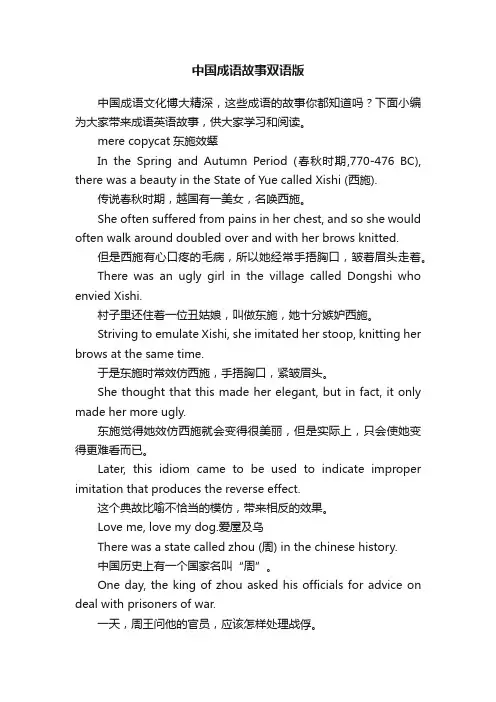
中国成语故事双语版中国成语文化博大精深,这些成语的故事你都知道吗?下面小编为大家带来成语英语故事,供大家学习和阅读。
mere copycat东施效颦In the Spring and Autumn Period (春秋时期,770-476 BC), there was a beauty in the State of Yue called Xishi (西施).传说春秋时期,越国有一美女,名唤西施。
She often suffered from pains in her chest, and so she would often walk around doubled over and with her brows knitted.但是西施有心口疼的毛病,所以她经常手捂胸口,皱着眉头走着。
There was an ugly girl in the village called Dongshi who envied Xishi.村子里还住着一位丑姑娘,叫做东施,她十分嫉妒西施。
Striving to emulate Xishi, she imitated her stoop, knitting her brows at the same time.于是东施时常效仿西施,手捂胸口,紧皱眉头。
She thought that this made her elegant, but in fact, it only made her more ugly.东施觉得她效仿西施就会变得很美丽,但是实际上,只会使她变得更难看而已。
Later, this idiom came to be used to indicate improper imitation that produces the reverse effect.这个典故比喻不恰当的模仿,带来相反的效果。
Love me, love my dog.爱屋及乌There was a state called zhou (周) in the chinese history.中国历史上有一个国家名叫“周”。
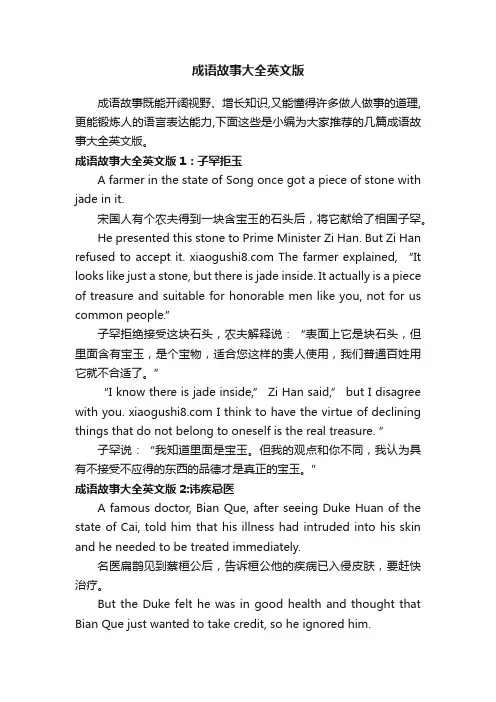
成语故事大全英文版成语故事既能开阔视野、增长知识,又能懂得许多做人做事的道理,更能锻炼人的语言表达能力,下面这些是小编为大家推荐的几篇成语故事大全英文版。
成语故事大全英文版1:子罕拒玉A farmer in the state of Song once got a piece of stone with jade in it.宋国人有个农夫得到一块含宝玉的石头后,将它献给了相国子罕。
He presented this stone to Prime Minister Zi Han. But Zi Han refused to accept it. The farmer explained, “It looks like just a stone, but there is jade inside. It actually is a piece of treasure and suitable for honorable men like you, not for us common people.”子罕拒绝接受这块石头,农夫解释说:“表面上它是块石头,但里面含有宝玉,是个宝物,适合您这样的贵人使用,我们普通百姓用它就不合适了。
”“I know there is jade inside,” Zi Han said,” but I disagree with you. I think to have the virtue of declining things that do not belong to oneself is the real treasure. ”子罕说:“我知道里面是宝玉。
但我的观点和你不同,我认为具有不接受不应得的东西的品德才是真正的宝玉。
”成语故事大全英文版2:讳疾忌医A famous doctor, Bian Que, after seeing Duke Huan of the state of Cai, told him that his illness had intruded into his skin and he needed to be treated immediately.名医扁鹊见到蔡桓公后,告诉桓公他的疾病已入侵皮肤,要赶快治疗。
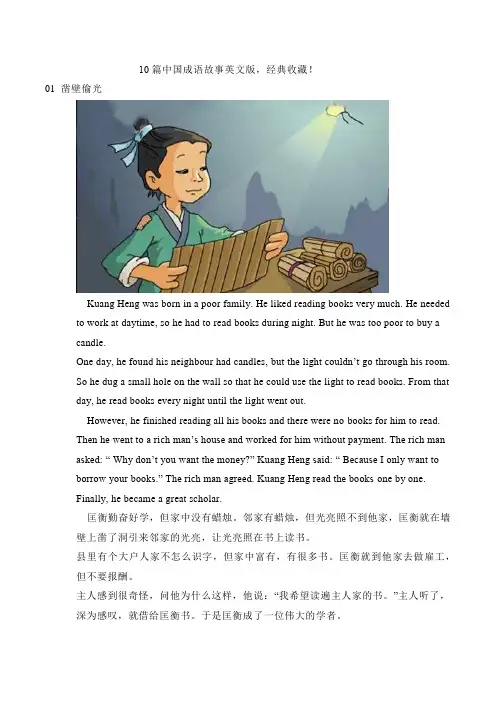
10篇中国成语故事英文版,经典收藏!01 凿壁偷光Kuang Heng was born in a poor family. He liked reading books very much. He needed to work at daytime, so he had to read books during night. But he was too poor to buy acandle.One day, he found his neighbour had candles, but the light couldn’t go through his room.So he dug a small hole on the wall so that he could use the light to read books. From that day, he read books every night until the light went out.However, he finished reading all his books and there were no books for him to read.Then he went to a rich man’s house and worked for him without payment. The rich man asked: “ Why don’t you want the money?” Kuang Heng said: “ Because I only want toborrow your books.” The rich man agreed. Kuang Heng read the books one by one.Finally, he became a great scholar.匡衡勤奋好学,但家中没有蜡烛。
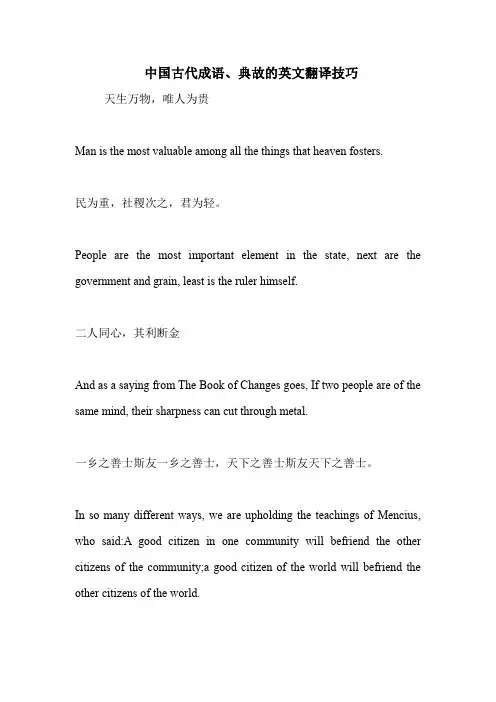
中国古代成语、典故的英文翻译技巧天生万物,唯人为贵Man is the most valuable among all the things that heaven fosters.民为重,社稷次之,君为轻。
People are the most important element in the state, next are the government and grain, least is the ruler himself.二人同心,其利断金And as a saying from The Book of Changes goes, If two people are of the same mind, their sharpness can cut through metal.一乡之善士斯友一乡之善士,天下之善士斯友天下之善士。
In so many different ways, we are upholding the teachings of Mencius, who said:A good citizen in one community will befriend the other citizens of the community;a good citizen of the world will befriend the other citizens of the world.不登高山,不知天之高也;不临深渊,不知地之厚也。
One can never be aware of the height of the sky or the depth of the earth, if he does not climb up a high mountain or look down into a deep abyss.但愿人长久,千里共婵娟。
We wigh each other a long life so as to share the beauty of this graceful moonlight, even though miles apart.独在异乡为异客,每逢佳节倍思亲。

惊弓之鸟Birds Startled by the Mere Twang of a Bowstring(来源免费)战国时期(公元前403―221年中国中原地区各诸侯国连年争战的时代)魏国有个名叫更羸的人。
一天,他对国王说:‚我只要拉开弓,空射一下,就能把天上的鸟射下来。
‛国王不相信。
更羸便对准天上飞来的一只雁射去,果真那只雁听到拉弦的声音就掉了下来。
国王感到很奇怪。
更羸说,‚那是一只受过伤的雁。
它一听到我拉开弓弦的声响,就惊慌得支持不住,自然要掉下来了。
‛In the Warring States Period, there was a man in the State of Wei called Geng Lei. One day he said to the king: 'I can shoot down birds by simply plucking my bowstring.' When the king expressed doubt, Geng Lei pointed his bow at a wild goose flying in the sky, twanged the bowstring, and the goose fell to the ground. Geng Lei said, 'This goose has been hurt in the past. Hearing the twang of the bowstring,it assumed that it was doomed. So it simply gave up trying to live.'‚惊弓之鸟‛这个成语比喻受过惊恐之后,有一点动静就特别害怕。
This idiom means that if one has been frightened in the pastone's will may become paralysed in a similar situation.毛遂自荐Mao Sui Recommending Himself战国时代,秦国军队攻打赵国的都城。
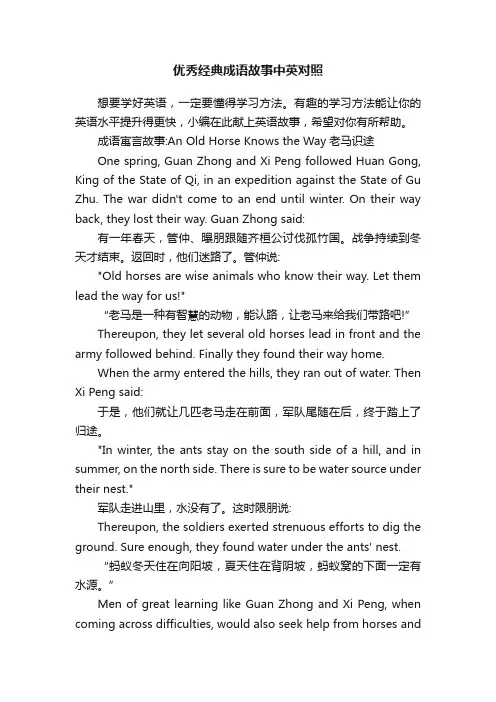
优秀经典成语故事中英对照想要学好英语,一定要懂得学习方法。
有趣的学习方法能让你的英语水平提升得更快,小编在此献上英语故事,希望对你有所帮助。
成语寓言故事:An Old Horse Knows the Way老马识途One spring, Guan Zhong and Xi Peng followed Huan Gong, King of the State of Qi, in an expedition against the State of Gu Zhu. The war didn't come to an end until winter. On their way back, they lost their way. Guan Zhong said:有一年春天,管仲、曝朋跟随齐桓公讨伐孤竹国。
战争持续到冬天才结束。
返回时,他们迷路了。
管仲说:"Old horses are wise animals who know their way. Let them lead the way for us!"“老马是一种有智慧的动物,能认路,让老马来给我们带路吧!”Thereupon, they let several old horses lead in front and the army followed behind. Finally they found their way home.When the army entered the hills, they ran out of water. Then Xi Peng said:于是,他们就让几匹老马走在前面,军队尾随在后,终于踏上了归途。
"In winter, the ants stay on the south side of a hill, and in summer, on the north side. There is sure to be water source under their nest."军队走进山里,水没有了。
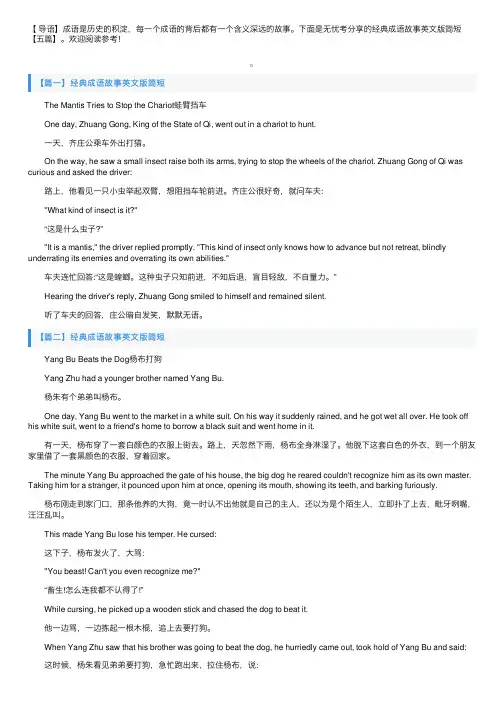
【导语】成语是历史的积淀,每⼀个成语的背后都有⼀个含义深远的故事。
下⾯是⽆忧考分享的经典成语故事英⽂版简短【五篇】。
欢迎阅读参考!【篇⼀】经典成语故事英⽂版简短 The Mantis Tries to Stop the Chariot蛙臂挡车 One day, Zhuang Gong, King of the State of Qi, went out in a chariot to hunt. ⼀天,齐庄公乘车外出打猎。
On the way, he saw a small insect raise both its arms, trying to stop the wheels of the chariot. Zhuang Gong of Qi was curious and asked the driver: 路上,他看见⼀只⼩⾍举起双臂,想阻挡车轮前进。
齐庄公很好奇,就问车夫: "What kind of insect is it?" “这是什么⾍⼦?” "It is a mantis," the driver replied promptly. "This kind of insect only knows how to advance but not retreat, blindly underrating its enemies and overrating its own abilities." 车夫连忙回答:“这是蝗螂。
这种⾍⼦只知前进,不知后退,盲⽬轻敌,不⾃量⼒。
” Hearing the driver's reply, Zhuang Gong smiled to himself and remained silent. 听了车夫的回答,庄公暗⾃发笑,默默⽆语。
【篇⼆】经典成语故事英⽂版简短 Yang Bu Beats the Dog杨布打狗 Yang Zhu had a younger brother named Yang Bu. 杨朱有个弟弟叫杨布。
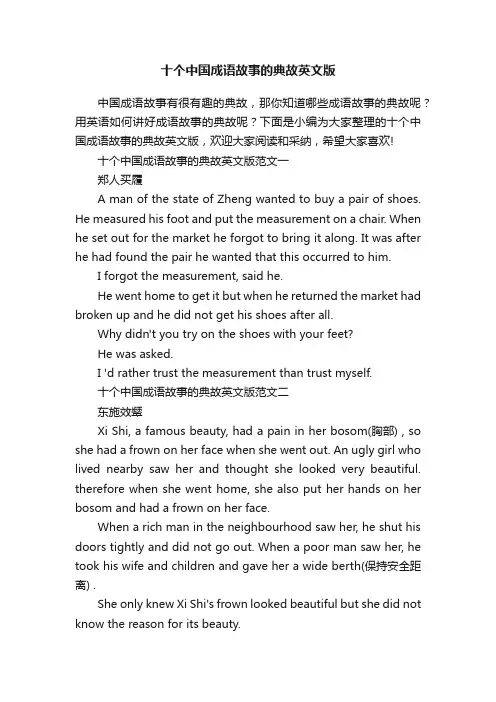
十个中国成语故事的典故英文版中国成语故事有很有趣的典故,那你知道哪些成语故事的典故呢?用英语如何讲好成语故事的典故呢?下面是小编为大家整理的十个中国成语故事的典故英文版,欢迎大家阅读和采纳,希望大家喜欢!十个中国成语故事的典故英文版范文一郑人买履A man of the state of Zheng wanted to buy a pair of shoes. He measured his foot and put the measurement on a chair. When he set out for the market he forgot to bring it along. It was after he had found the pair he wanted that this occurred to him.I forgot the measurement, said he.He went home to get it but when he returned the market had broken up and he did not get his shoes after all.Why didn't you try on the shoes with your feet?He was asked.I 'd rather trust the measurement than trust myself.十个中国成语故事的典故英文版范文二东施效颦Xi Shi, a famous beauty, had a pain in her bosom(胸部) , so she had a frown on her face when she went out. An ugly girl who lived nearby saw her and thought she looked very beautiful. therefore when she went home, she also put her hands on her bosom and had a frown on her face.When a rich man in the neighbourhood saw her, he shut his doors tightly and did not go out. When a poor man saw her, he took his wife and children and gave her a wide berth(保持安全距离) .She only knew Xi Shi's frown looked beautiful but she did not know the reason for its beauty.十个中国成语故事的典故英文版范文三专心致志Yi Qiu was known as the most famous expert at chess throughout the land. Once he gave lessons on chess to two men. One of them was netpletely absorbed in his teaching, listening attentively to Yi Qiu while the other, who seemed to be listening, had his mind on something else. In fact, he was having a fancy that a swan was flying towards him and he had in his hands a bow and an arrow, ready to shoot. As a result, though he was having the same lesson together with the first man, yet he turned out a much inferior(差的,自卑的) pupil.If one does not give single-hearted devotion to it, no skills will be learned.十个中国成语故事的典故英文版范文四买椟还珠A man from the state of Chu wanted to sell a precious pearl in the state of Zheng. He made a casket(小箱,棺材) for the pearl out of the wood from a magnolia(木兰) tree, which he fumigated(熏制) with spices. He studded the casket with pearls and jade, ornamented it with red gems and decorated it with kingfisher(翠鸟) feathers. A man of the state of Zheng bought the casket and gave him back the pearl.Too luxuriant(丰富的,奢华的) decoration usually supersedes(取代) what really counts. This man from Chu certainly knew how to sell a casket but he was no good at selling his pearl. And the man of Zheng didn't know which is really valuable.十个中国成语故事的典故英文版范文五万事俱备只欠东风China has been divided into three kingdoms historically: Wei in the north, Shu in the southwest and Wu in the southeast.Once Cao Cao from Wei led a 200,000 strong army down to the south to wipe out the kingdoms of Wu and Shu. Therefore, Wu and Shu united to defend his attack. Cao ordered his men to link up the boats by iron chains to form a bridge for the Cao's passing from the north bank of Yangtze River to the south bank. The General Commander of the allied army was Zhou Yu. He analyzed the situation carefully. Then he got a good idea. He decided to attack the enemy with fire. So he began to prepare for the neting battle. Suddenly he thought of the direction of wind. He needed the east wind to blow strongly in order to acnetplish his scheme. However, the wind did not nete for days. Thus Zhou Yu was worried about it. At that time, he got a note from Zhuge Liang, the military adviser of the State of Shu, which reads: "To fight Cao CaoFire will help you winEverything is readyExcept the east wind"Quickly he turned to Zhuge Liang for help. Zhuge told him not to worry and there would be an east wind in a couple of days. Two days later, the east wind helped Zhou acnetplish his scheme. At last, the allied army won the war.Later, people use it to say "All is ready except what is crucial".十个中国成语故事的典故英文版范文六相敬如宾During the Spring and Autumn Period (770-476 BC), there was a high official in the State of Jin. He once saw a farmer working in the field and his wife bringing his lunch to him in a very respectful manner. He showed great interest in the matter. He took the farmer back to Jin with him, and said to the King of Jin, "Respect is a demonstration of virtue. If one is respectful, hemust be virtuous. We should educate our people with virtue." But the King asked, "His father is guilty, is it wise to do so?" He replied, "Guan Zhong had been enemy to the Duke Huan of Qi, but the duke appointed Guan Zhong prime minister and finally acnetplished his hegemony. Shun exiled Gun but promoted his son Yu. You just make use of his strong points." At last, Duke Wen took his advice and put the farmer in an important position.Later, this idiom means a couple treats each other with respect like guests.十个中国成语故事的典故英文版范文七入木三分Wang Xi-zhi is one of the most famous calligraphers(书法家) during the Eastern Jin Dynasty of China. When he was very young, he practiced his art every day and never stopped.Later he absorbed the strong points of all the other schools of calligraphy, and developed his own unique style of writing. Because of his achievements, he has been honored as one of China's sages of calligraphy. One time, Wang Xi-zhi sketched in wood for an engraver to cut. Then the engraver found the ink had penetrated one centimeter into the wood."Ru Mu San Fen" is got from this story, which means the calligraphy is penetrating.Now it is often used to describe expressing sharp ideas or profound views.十个中国成语故事的典故英文版范文八一技之长Gong sun Long , is a famous scholar lived in the State of Zhao during the Warring States Period (475-221BC). He had kept a circle skilled people around him. He often said, "A wise man should welnete anyone with a specialty."One day, a man dressed in tattered(破烂的) and dirty clothes came to see him and said to him:" I have a special skill. "Gong asked: "What is it?""I have a loud voice and I'm good at shouting."Then Gong turned to his followers and asked," Who is good at shouting?" But none of them answered "Yes ". So the scholar took the man in.Some days later, Gong and his followers went on a trip. They came to a wide river and found the ferryboat was on the other side of the river. All of them had no idea. Suddenly, Gong thought of the shouting expert and turned to him, "Can you have a try?" The man realized it was the chance to show his skill. He shouted to the ferryman as loud as he could, "Hey, ferryman, nete here, we want to cross the river." As his voice ended, the ferryman came to fetch them. Gong was very satisfied with the new follower.Later, people use it to describe anyone who has a special professional skill.十个中国成语故事的典故英文版范文九叶公好龙In the Spring and Autumn Period, there lived in Chu a person named Chu Zhuliang, who addressed himself as "Lord Ye".It's said that this Lord Ye was very fond of dragons. The walls had dragons painted on them. The beams, pillars, doors and the windows were all carved with them. As a result, his love for dragons was spread out. When the real dragon in heaven heard of this Lord Ye, he was deeply moved. He decided to visit Lord Ye to thank him.You might think Lord Ye was very happy to see a real dragon. But, actually, at very the sight of the creature, he was scared outof his wits and ran away as fast as he could.From then on, people knew that Lord Ye only loved pictures or carvings which look like dragons, not the real thing.十个中国成语故事的典故英文版范文十望梅止渴Among the outstanding figures of Chinese history, famous either for their intelligence or treachery(背叛,变节), Cao Cao is one of the foremost.One hot day, he marched out his troops under a burning sun in a mountainous area. Bewilderingly(令人困惑地) he lost the way. The journey was long and the sun was scorching. After their fruitless and tiresome march, all voiced their great dissatisfaction with the leadership of Cao Cao. They bitterly complained of their great thirst. The antagonism(对抗) of the soldiers was growing fast and they were on the verge of staging a mutiny(兵变). The subordinate officers were helpless to cope with the situation.Cao Cao, however, in the nick of time cleverly and treacherously gave orders to his troops to march to the nearby plum trees for a rest and announced that soldiers would be allowed to eat the juicy sour(酸的) fruit as much as they desired.At the thought of the sour fruit the soldiers' complaint of great thirst as well as the antagonistic feeling were quickly forgotten.Based on the story the later generation formed the proverb "to quench one's thirst by looking up at plums", to illustrate a case where one takes comfort in believing that they have already attained that which was expected or desired.。
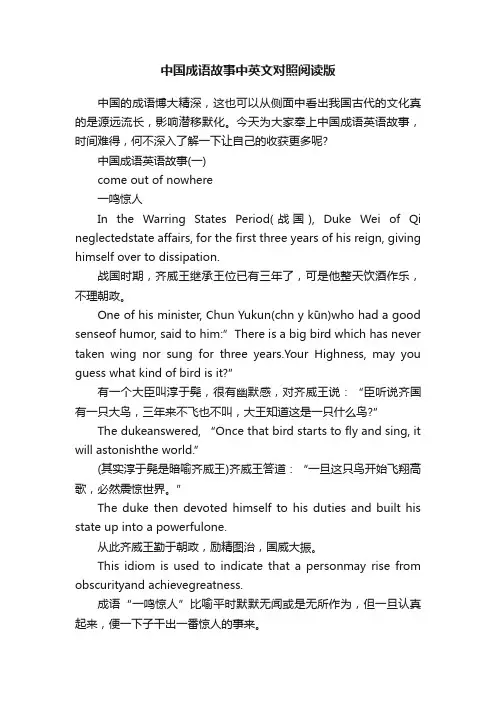
中国成语故事中英文对照阅读版中国的成语博大精深,这也可以从侧面中看出我国古代的文化真的是源远流长,影响潜移默化。
今天为大家奉上中国成语英语故事,时间难得,何不深入了解一下让自己的收获更多呢?中国成语英语故事(一)come out of nowhere一鸣惊人In the Warring States Period(战国), Duke Wei of Qi neglectedstate affairs, for the first three years of his reign, giving himself over to dissipation.战国时期,齐威王继承王位已有三年了,可是他整天饮酒作乐,不理朝政。
One of his minister, Chun Yukun(chn y kūn)who had a good senseof humor, said to him:”There is a big bird which has never taken wing nor sung for three years.Your Highness, may you guess what kind of bird is it?”有一个大臣叫淳于髡,很有幽默感,对齐威王说:“臣听说齐国有一只大鸟,三年来不飞也不叫,大王知道这是一只什么鸟?”The dukeanswered, “Once that bird starts to fly and sing, it will astonishthe world.”(其实淳于髡是暗喻齐威王)齐威王答道:“一旦这只鸟开始飞翔高歌,必然震惊世界。
”The duke then devoted himself to his duties and built his state up into a powerfulone.从此齐威王勤于朝政,励精图治,国威大振。
This idiom is used to indicate that a personmay rise from obscurityand achievegreatness.成语“一鸣惊人”比喻平时默默无闻或是无所作为,但一旦认真起来,便一下子干出一番惊人的事来。
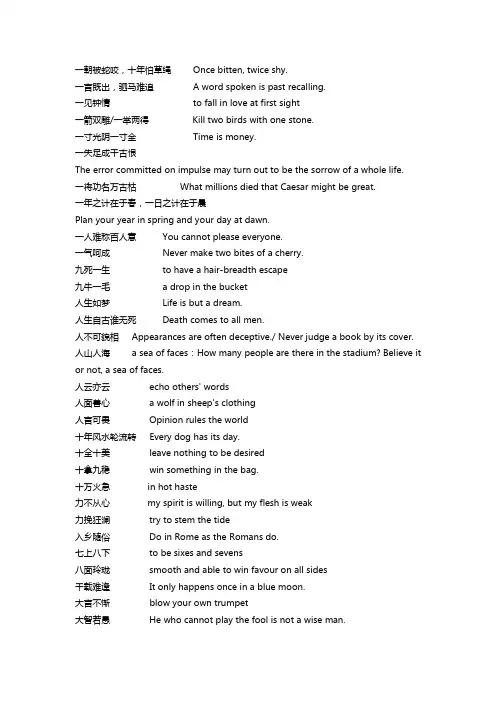
一朝被蛇咬,十年怕草绳Once bitten, twice shy.一言既出,驷马难追 A word spoken is past recalling.一见钟情to fall in love at first sight一箭双雕/一举两得Kill two birds with one stone.一寸光阴一寸金Time is money.一失足成千古恨The error committed on impulse may turn out to be the sorrow of a whole life.一将功名万古枯What millions died that Caesar might be great.一年之计在于春,一日之计在于晨Plan your year in spring and your day at dawn.一人难称百人意You cannot please everyone.一气呵成Never make two bites of a cherry.九死一生to have a hair-breadth escape九牛一毛 a drop in the bucket人生如梦Life is but a dream.人生自古谁无死Death comes to all men.人不可貌相Appearances are often deceptive./ Never judge a book by its cover. 人山人海 a sea of faces:How many people are there in the stadium? Believe it or not, a sea of faces.人云亦云echo others' words人面兽心 a wolf in sheep's clothing人言可畏Opinion rules the world十年风水轮流转Every dog has its day.十全十美leave nothing to be desired十拿九稳win something in the bag.十万火急in hot haste力不从心my spirit is willing, but my flesh is weak力挽狂澜try to stem the tide入乡随俗Do in Rome as the Romans do.七上八下to be sixes and sevens八面玲珑smooth and able to win favour on all sides千载难逢It only happens once in a blue moon.大言不惭blow your own trumpet大智若愚He who cannot play the fool is not a wise man.大海捞针needle in a haystack山穷水尽at the end of one's resources山中无老虎,猴子称大王Among the blind the one-eyed is king./When the cat's away, the mice will pay.小洞不补,大来吃苦 A stitch in time saves nine.亡羊补牢Better late than never./ It's never too late to mend.口是心非Speak with one's tongue in his cheek不畏艰难Take the bull by the horns.不战而屈人之兵The supreme art of war is to subdue the enemy without fighting. 不胜其烦 a pain in the neck1. 鹬蚌相争,渔翁得利这个成语我们可以翻译成:a quarrel which benefits only a third party或者借用英语中一句相应的俗语:When shepherds quarrel, the wolf has a winning game。
英文成语故事附翻译英文成语故事附翻译(通用13篇)故事是一种文学体裁,生动的,美妙的故事可以帮你认识社会、理解人生,引导你做一个通达事理、明辨是非的人。
下面是小编帮大家整理的英文成语故事附翻译,供大家参考借鉴,希望可以帮助到你。
英文成语故事附翻译篇1During the Spring and Autumn Period (770-476 BC), prince Zhou Xu of the State of Wei killed his brother and became the new emperor. Zhou Xu was a tyrant. He oppressed his people and indulged in wars of agGREssion. By launching wars, he tried to divert the peoples attention and reduce their discontent with him in order to consolidate his dictatorship.The Duke of the State of Lu leant about Zhou Xus usurpation of state power and his ambitious plan, he asked a senior official, "What do you think about Zhou Xus move? "The official answered, "He indulges in wars , bringing his people much disaster. He wont get their support. And hes capricious, so few of his close friends follow him. He can never achieve his success. In addition, war is like fire. If one launches wars endlessly without restraint, hell eventually burn himself. "Sure enough, the people of Wei with the help of the State of Chen overthrew Zhou Xu and killed him in less than a year.Later, people use it to mean that those who do evil will finally ruin themselves.春秋时期,卫国的王子州吁杀死了他的哥哥卫桓公,成为了卫国的国君。
经典英语成语故事中英双语想要学好英语,一定要懂得学习方法。
有趣的学习方法能让你的英语水平提升得更快,小编在此献上英语故事,希望对你有所帮助。
成语寓言故事:Tyranny Is Fiercer than Tigers苛政猛于虎In ancient times, at the foot of Mount Tai surrounded by mountains, one often heard of tales of tigers devouring people 古代,在群山环抱的泰山脚下,常常听到老虎吃人的事情。
One day, Confucius and his disciples passed by Mount T ai. As they walked along, his disciples talked about what they had heard and seen.有一天,孔子带着弟子路过泰山。
弟子们一边走,一边谈论着所见所闻。
Suddenly, they heard someone weeping in the distance. They went over and saw a young woman who, with her head covered with a white kerchief, wore white cotton clothes, trousers, shoes and stockings. She was kneeling in front of a new grave and weeping bitterly. The disciples didn't know what to do. Confucius ordered one of them to go forward and ask:忽然,听到远处传来哭声。
大家便走了过去,一看原来是一个年轻的妇女,头上包着白色的头巾,身上穿着白布衣裤,脚上套着白布鞋袜,正跪在一座新坟前面痛哭。
中国成语故事中英对照想要学好英语,一定要懂得学习方法。
有趣的学习方法能让你的英语水平提升得更快,小编在此献上英语故事,希望对你有所帮助。
成语寓言故事:If the Lips Are Gone, the Teeth Will Be Cold唇亡齿寒Between the States of Jin and Guo was the State of Yu.晋国和掳国的中间,隔着一个虞国。
Once, the State of Jin intended to invade the State of Guo and had to seek for permission to go by way of the State of Yu. The King of Jin was worried that the State of Yu would refuse to consent.有一次,晋国要去进攻掳国,得向虞国借路,国王担心虞国不答应。
Xun Xi, a high official of the State of Jin, offered his scheme to the King. He said:晋国的大臣荀息向国王献计,说:"If you offer that piece of round jade and that fine steed as gifts to the King of Yu to ask his permission, he is sure to give his consent."“如果您把那块璧玉和那匹良马送给虞工,向他借路,那么他一定会答应的。
”The King of Jin said:晋王说:"The round jade from Chuiji is an heirloom from my ancestors. The fine steed from Qudi is a great favorite of mine. If the King of Yu accepted our gifts, yet would not give us permission, what shall we do then?"“垂棘的璧玉是我祖先的传家宝;屈地的良马是我最喜欢的骏马。
惊弓之鸟Birds Startled by the Mere Twang of a Bowstring战zh àn 国gu ó 时sh í 期q ī(公g ōng 元yu án 前qi án403―221年ni án 中zh ōng 国gu ó中zh ōng 原yu án 地d ì 区q ū 各g è 诸zh ū 侯h óu 国gu ó 连li án年ni án 争zh ēng 战zh àn 的de 时sh í 代d ài )魏w èi 国gu ó 有y ǒu 个g è 名m íng 叫ji ào 更g èng 羸l éi 的de 人r én。
一y ī 天ti ān,他t ā 对du ì 国gu ó 王w áng说shu ō:“我w ǒ 只zh ī 要y ào 拉l ā 开k āi 弓g ōng,空k ōng 射sh è 一y ī 下xi à,就ji ù 能n éng 把b ǎ 天ti ān 上sh àng 的de 鸟ni ǎo 射sh è 下xi à 来l ái。
”国gu ó王w áng 不b ù 相xi āng 信x ìn。
更g èng 羸l éi 便bi àn 对du ì 准zh ǔn 天ti ān 上sh àng 飞f ēi 来l ái 的de 一y ī 只zh ī 雁y àn 射sh è 去q ù,果gu ǒ 真zh ēn 那n à 只zh ī雁y àn 听t īng 到d ào 拉l ā 弦xi án 的de 声sh ēng 音y īn 就ji ù 掉di ào 了l e 下xi à 来l ái 。
成语故事中英文对照
以下是成语故事的中英文对照:
中文版:
《掩耳盗铃》
从前,有一个人看到别人家门口挂着一个漂亮的铃铛,于是他想要偷走这个铃铛。
但是,他用手捂住自己的耳朵,害怕铃铛的声音会被人听到,然后被抓到。
然而,他忽略了铃铛声音是别人听到的,结果他被抓住了。
这个成语用来比喻自己欺骗自己,不听别人的忠告。
英文版:
Long ago, a person saw a beautiful bell hanging outside someone's door. He wanted to steal the bell, but he covered his ears with his hands, afraid that the sound of the bell would be heard and he would be caught. However, he ignored the fact that the sound of the bell was heard by others, and he was caught. This idiom is
used to describe a person who deceives himself and disregards the advice of others.。
【导语】中国的成语博⼤精深,这也可以从侧⾯中看出我国古代的⽂化真的是源远流长,影响潜移默化。
下⾯是分享的中国成语故事英⽂版带翻译【六篇】。
欢迎阅读参考!【篇⼀】中国成语故事英⽂版带翻译 熟能⽣巧 Although Chen Yaozi was a civil official in Song Dynasty, he loved archery very much, and was pretty good at it. 宋朝⼤⾂陈尧咨虽然是进⼠出⾝,却爱好射箭,⽽且技艺不俗。
One day he was practicing in his own field, and eight or nine times out of ten he hit the target. He became quite complacent. ⼀天,他在⾃家的场地上演习,中靶率⾼达百分之⼋九⼗,⼼中⼤为得意。
Looking around, he found an old man who sells oil standing nearby. And the old man only nodded slightly towards his skills, not amazed. Angered by this, he called the old man to come over and asked him, “Do you also know archery? Aren’t my skills brilliant?” The old man took out a gourd from the wicker-basket and placed it on the ground. He covered the opening of the gourd with a copper coin. And then he scooped a spoon of oil and began to pour the oil into the gourd through the hole in the coin drop by drop without wetting the coin. 四周⼀看,发现旁边站了很久的⼀位卖油的⽼头对此只是微微点点头,并不特别惊讶,顿时⽆名⽕起,将⽼头叫过来,问道:“你也懂射箭吗?我的技术难道不⾼明吗?”⽼头从筐⾥取出⼀只葫芦,放在地上,⽤⼀枚铜钱盖住葫芦⼝,舀出⼀勺油,通过钱眼,⼀滴⼀滴倒进葫芦⾥,铜钱上⼀星油迹也没有。
成语典故之中英对照惊弓之鸟Birds Startled by the Mere Twang of a Bowstring战国时期(公元前403―221年中国中原地区各诸侯国连年争战的时代)魏国有个名叫更羸的人。
一天,他对国王说:“我只要拉开弓,空射一下,就能把天上的鸟射下来。
”国王不相信。
更羸便对准天上飞来的一只雁射去,果真那只雁听到拉弦的声音就掉了下来。
国王感到很奇怪。
更羸说,“那是一只受过伤的雁。
它一听到我拉开弓弦的声响,就惊慌得支持不住,自然要掉下来了。
”In the Warring States Period, there was a man in the State of Wei called Geng Lei. One day he said to the king: 'I can shoot down birds by simply plucking my bowstring.' When the king expressed doubt, Geng Lei pointed his bow at a wild goose flying in the sky, twanged the bowstring, and the goose fell to the ground. Geng Lei said, 'This goose has been hurt in the past. Hearing the twang of the bowstring, it assumed that it was doomed. So it simply gave up trying to live.'“惊弓之鸟”这个成语比喻受过惊恐之后,有一点动静就特别害怕。
This idiom means that if one has been frightened in the past one's will may become paralysed in a similar situation.毛遂自荐Mao Sui Recommending Himself战国时代,秦国军队攻打赵国的都城。
赵国的平原君打算亲自到楚国去请救兵,想挑选一个精明能干的人一同前去。
有一个名叫毛遂的人,自告奋勇愿意同去。
平原君到楚国后,与楚王谈了半天,没有一点结果。
毛遂怒气冲冲地拿着宝剑,逼近楚王,终于迫使楚王答应出兵,与赵国联合共同抵抗秦国。
In the Warring States Period, the State of Qin besieged the capital of the State of Zhao. Duke Pingyuan of Zhao planned to ask the ruler of the State of Chu personally for assistance. He wanted to select a capable man to go with him. A man called Mao Suivolunteered. When the negoti-actions between the two states were stalled because the ruler of Chu hesitated to send troops, Mao Sui approached him, brandishing a sword. At that, the ruler of Chu agreed to help Zhao, against Qin.“毛遂自荐”这个成语用来比喻自己推荐自己,不必别人介绍。
This idiom means to recommend oneself.世外桃源A Haven of Peace and Happiness东晋的文学家陶渊明写了一片著名的文章叫《桃花源记》。
叙述一个渔人出外捕鱼的时候,偶然来到了桃花源这个地方。
从这里通过一个山洞,发现了一个村子,这里的居民是秦朝时避难人的后代。
这是一个与世隔绝、没有剥削和压迫、人人安居乐业的美好社会。
渔人告别村民回家以后,再也找不到这个地方了。
Tao Yuanming, a famous writer of the Eastern Jin Dynasty (317-420), wrote the well-known essay Peach-Blossom Spring. In it he tells a story which goes like this: A fisherman happened to come upon a place called Peach-Blossom Spring. Squeezing through a cave, he found a village, the residents of which were descendants of refugees from the Qin Dynasty. It was a paradise isolated from the outside world, without exploitation or oppression, and everybody living and working in peace and contentment. The fisherman left the villagers and went home. But he could never find the place again.后来,由这个故事产生了“世外桃源”这个成语,用来比喻与世隔绝的、理想的美好世界。
This idiom is derived from the above story, and is used to mean an isolated, ideal world.南辕北辙Going South by Driving the Chariot North从前有个人要到南方去,他坐的车子却向北方行驶。
过路人说:“你去南方,车子怎么向北行驶呢?”他回答说:“我的马很能跑路,我的车夫驾车的技术也很高明,加上我又带了充足的路费。
”这个人没有考虑到,方向弄反了,他的条件越好,离他要去的地方就越远。
Once a man wanted to go to the south, but his carriage was heading north. A passer-by asked him: 'If you are going to the south, why is your chariot heading north? ' The man answered, 'My horse is good at running, my driver is highly skilled at driving a carriage, and I have enough money. ' The man didn't consider that the direction might be wrong; the better his conditions were, the further he was away from his destination.后来人们就把这个故事概括为“南辕北辙”,比喻一个人的行为和他的目的正好相反。
The idiom derived from this story indicates that one's action was the opposite effect to one's intention.画龙点睛Putting the Finishing Touch to the Picture of a Dragon南北朝(公元420--589)时期,有个画家叫张僧繇。
有一次,他到一个寺庙去游玩,在墙壁上面画了四条龙,可是都没有画出眼睛。
看画的人觉得很奇怪,问他为什么不画出眼睛。
他说:“眼睛是龙的关键,画上眼睛,龙就会飞走了。
”大家不相信他说的话。
张僧繇拿起笔来,刚给两条龙点上眼睛,立刻电闪雷鸣,两条龙飞向天空,墙上只剩下两条没有画眼睛的龙。
In the Southern and Northern Dynasties Period (420-589), there was a painter called Zhang Sengyou. Once he visited a temple and painted on the wall four dragons, but gave none of them eyes. The onlookers felt that this was odd, and asked why he hadn't painted the eyes. He answered, 'Eyes are crucial for dragons. With the eyes painted on, the dragons would fly away.' Nobody believed this, so Zhang Sengyou took up his brush and added eyes to two of the dragons. No sooner had he finished than the two dragons flew into the sky amid a thunderstorm. The two without eyes stayed painted on the wall.“画龙点睛”这个成语用来比喻讲话或写文章时,在关键地方加一两句重要的话,使内容更加生动有力。
This idiom is used to describe how, when writing or speaking, one or two key sentences will enhance the contents.画蛇添足Drawing a snake and Adding Feet战国时代有个楚国人祭他的祖先。
仪式结束后,他拿出一壶酒赏给手下的几个人。
大家商量说:“我们都来画蛇,谁先画好谁就喝这壶酒。
”其中有一个人先画好了。
但他看到同伴还没有画完,就又给蛇添上了脚。
这时,另一个人也画好了,夺过酒壶吧酒喝了,并且说:“蛇本来是没有脚的,你怎么能给它添上脚呢?”In the Warring States Period, a man in the State of Chu was offering a sacrifice to his ancestors. After the ceremony, the man gave a beaker of wine to his servants. The servants thought that there was not enough wine for all them, and decided to each draw a picture of a snake; the one who finished the picture first would get the wine. One of them drew very rapidly. Seeing that the others were still busy drawing, he added feet to the snake. At this moment another man finished, snatched the beaker and drank the wine, saying, 'A snake doesn't have feet. How can you add feet to a snake? '“画蛇添足”这个成语比喻做了多余而不恰当的事,反而把事情弄糟了。